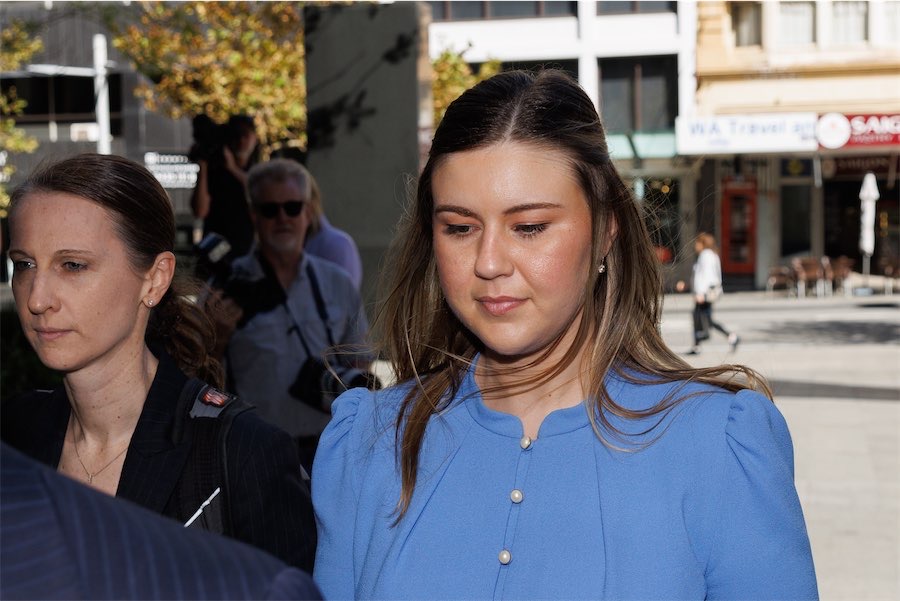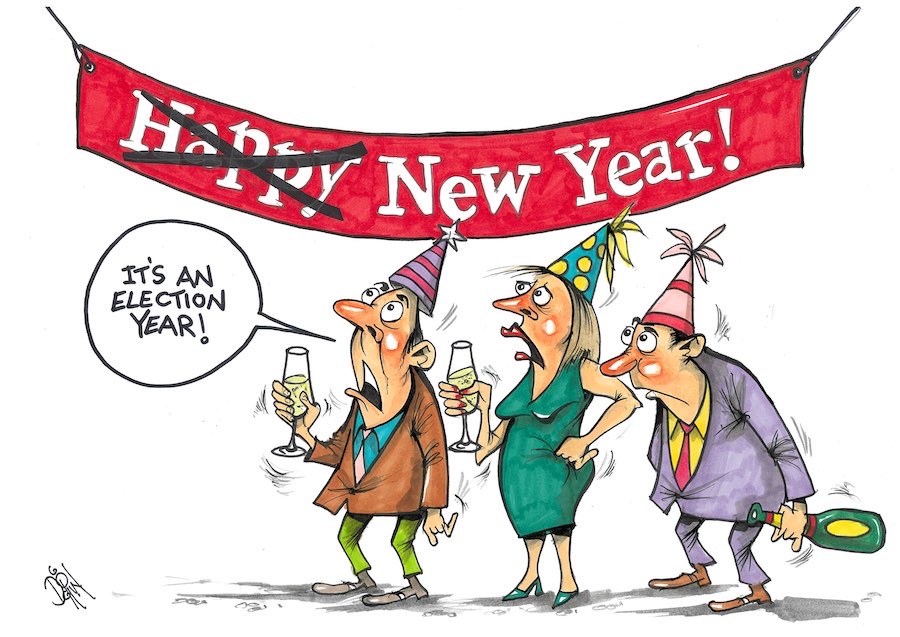
Brittany Higgins has declined to give evidence in defending the defamation action taken against her by Senator Linda Reynolds. What does this mean for her case? Legal columnist HUGH SELBY tries to make sense of what’s happening and explain the clues we can’t see.
No one would ever ask me to file a report about a sporting event. If they asked, it would be out of their ignorance of my ignorance of the rules of the game.

Who wants to listen to, or read, commentary from the uninformed? You don’t. I don’t either.
CityNews, thank goodness, brings you commentary on government action and inaction, music, theatre, exhibitions, food and wine, seasonal gardening, film and literature, being kind and wide-ranging whimsy, which is penned or drawn by people who know their stuff.
Why then do the heavy hitters of mainstream media persist in having the reporting of what goes on in our courts and tribunals done by people who have no clue about litigation preparation, courtcraft or evidential rules?
As we get to the end of plaintiff Senator Linda Reynolds’ case, in her defamation claim against Brittany Higgins, we ought to be able to fairly assess which of the two parties is travelling better and why.
We can’t, because those reporting this case are required to summarise the content without knowing what matters and what doesn’t.
So as soon as AI talent gets around to writing software that interrogates court transcripts with the questions that need to be answered, such as the extent to which a witness did or did not enhance the argument being put by the party calling them, then court reporting as we know it will be dead. AI will do it so much better.
Meantime, here are three current questions for which you deserve to be better informed.
Client-lawyer privilege
The first is last week’s news that the senator’s lawyers had subpoenaed the national solicitors HWL Ebsworth, solicitors for the Commonwealth in the settlement of Ms Higgins’ 2022 compensation claim, to produce to the Perth court by this Wednesday the correspondence between them and Ms Higgins’ solicitors around the time of the settlement.
Readers of my weekend column “Beat up or stuff up, it’s still dangerously wrong” will recall the mainstream reporting of a “weird” assertion that the senator (who was not that firm’s client) was – for some unstated reason – owed a duty by that firm.
It’s a fundamental part of the client-lawyer relationship that their communications (both spoken and written) cannot be revealed to third parties (which includes other people who would love to know) without the express permission of the client.
Why would either the Commonwealth or Ms Higgins want to give up their “privilege” to keep their communications hidden? The exceptions to the claim, being a client complaining about their lawyer, or the client revealing to their lawyer that they intend to commit a crime, do not apply.
What’s more, there is a strong public interest in encouraging settlements: they are much cheaper and quicker than contested hearings. If the content of these confidential documents about a settlement process become known then it would be foolish for anyone to consider settlement negotiations in the future.
The rule of fairness
The second question is the extent, if any, to which the rule of fairness (otherwise known as the Rule in Browne v Dunn) was followed by Rachael Young, the advocate for defendant Ms Higgins, when she cross-examined the senator and her witnesses.
For our purposes the rule requires a defendant when cross-examining a plaintiff witness to give that witness the opportunity to comment upon any factual matter in which that witness and the defence case have different versions.
The senator’s case is that her actions following whatever happened between Mr Lehrmann and Ms Higgins that fateful 2019 night were wholly reasonable and supportive of Ms Higgins on the facts as the senator then knew them.
Ms Higgins “published” material that was critical of the actions of not just the senator, but also other politicians and staff. That criticism, alleges the senator, damaged the senator’s reputation and entitles the senator to a money payment to compensate for that reputational loss.
Ms Higgins’ defence is that what she “published” was true.
The application of the fairness rule meant that during the cross-examinations the reasons for Ms Higgins asserting “truth” had to be brought up with the senator and her witnesses.
Put another way, we the public (along with the judge and each witness) should have learned of the evidence in support of that “truth” with each cross-examination.
If that happened it was not reported in the mainstream media that I have seen.
If that happened it was so unexciting that mainstream media saw no news value in it.
Knowledgeable court reporters would have been looking for compliance by Ms Higgins’ advocate with the rule of fairness. They would have been looking for how she set up each target witness to score points from their answers that would help in her submission as to why Ms Higgins should win.
Whatever Ms Higgins’ advocate did to cut down the effectiveness of the evidence from the senator and her witnesses was not shared with us.
There is no need to comply with the rule of fairness if your client and/or their witnesses are not going to give an opposing evidentiary account.
The lack of any reporting of the “truth” material being raised successfully with the senator and her witnesses was an early warning that Ms Higgins would not be giving evidence.
Brittany doesn’t take the field
Late on Monday, the Perth court was told that Ms Higgins would not be giving evidence. The decision does not surprise, though its timing was probably brought forward by the senator’s case finishing some days earlier than expected.
Although the interested public was interested, possibly very interested, in how Ms Higgins would show her “truth”, it is not the law that a defendant must give evidence.
It was reported on Monday that there were three reasons why Ms Higgins would not be giving evidence:
- She is not obliged to give evidence;
- Her legal team don’t think it needs to call Miss Higgins to win; and,
- Ms Higgins’ medical state, for which medical reports were given to the court.
In this saga there is a record of Ms Higgins being afflicted by debilitating “mental incapacity”. There is also a record of her wonderful resilience, as in her late 2022 rapid recovery from in-patient treatment in time to be active in the settlement, and in her social media postings during this hearing.
I’m sure that we can all wish her a speedy recovery from her afflictions, the more so as there is an infant on the way.
Meantime, let us not forget that a feature of this hearing has been the mental health impact upon the senator and former staffer Fiona Brown. The latter is now not capable of giving evidence. I repeat my earlier published request that the Finance Minister make an ex-gratia payment to her, especially as her life seems to have been destroyed by this saga, while Ms Higgins has a life ahead.
The Higgins’ defence may or may not choose to call other witnesses to help establish the “truth” defence. If any one or more such witnesses are called we can regard them as understudies to the sorely afflicted Ms Higgins. How effective she, he or they might be is hard to guess – because as explained above – we don’t know what was suggested in cross-examination.
There can still be a tangible benefit to Ms Higgins’ case in not calling any witnesses.
If the defendant in a civil case, such as defamation, chooses not to bring any evidence then the plaintiff must give their closing submissions first, followed by the defence.
So far as I know the judge has not yet told the parties whether he wants only written, only spoken or a mixture of both as closing argument.
This order of submissions gives the defendant the chance to look for any gaps in the plaintiff’s arguments and attempt to rebut them. That can be an effective strategy. This time? Time will tell.
Former barrister Hugh Selby is the CityNews legal columnist. His free podcasts on “Witness Essentials” and “Advocacy in court: preparation and performance” can be heard on the best known podcast sites.
Who can be trusted?
In a world of spin and confusion, there’s never been a more important time to support independent journalism in Canberra.
If you trust our work online and want to enforce the power of independent voices, I invite you to make a small contribution.
Every dollar of support is invested back into our journalism to help keep citynews.com.au strong and free.
Thank you,
Ian Meikle, editor





Leave a Reply